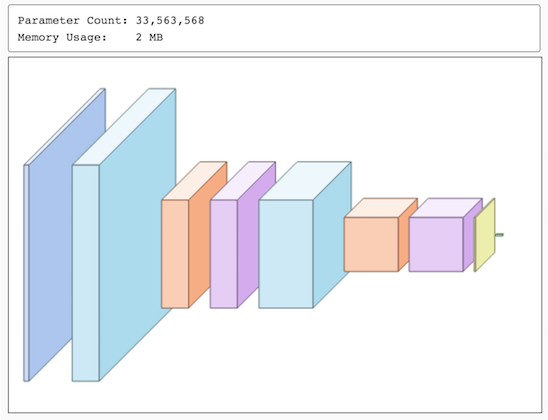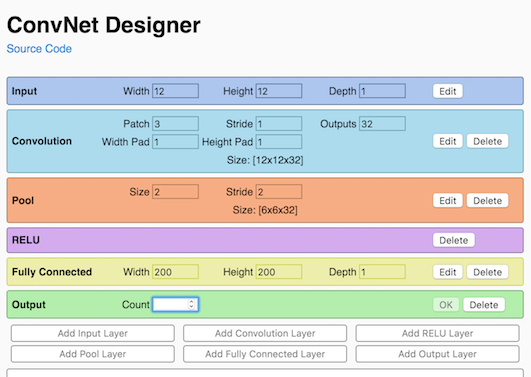This utility is intended to help anyone who needs to design a Convolutional Neural Network, and may be particularly useful if using Google's Tensorflow library.
The utility is available to use online, or can be downloaded from GitHub and used offline by opening the main.html file in a web browser.
The utility performs the following functions:
- Visualises the network, showing the relative layer sizes and helping to ensure that the overal 'shape' of the network is correct:
- Computes the total number of parameters required by the network, allowing the computational complexity of different designs to be compared
- Estimates the amount of memory required by the network
- Validates patch size and stride values for convolutional layers, automatically applying zero-padding if required
- Validates pool size and stride values for pooling layers
- Generates the Tensorflow code required to construct the network (example code below)
x0 = tf.placeholder(tf.float32, shape=[None, 49152])
x1 = tf.reshape(x0, [-1,128,128,3])
x2 = tf.Variable(tf.truncated_normal([3, 3, 3, 32], stddev=0.1))
x3 = tf.nn.conv2d(x1, x2, strides=[1, 1, 1, 1], padding='SAME')
x4 = tf.nn.max_pool(x3, ksize=[1, 2, 2, 1], strides=[1, 2, 2, 1], padding='SAME')
x5 = tf.Variable(tf.constant(0.1, shape=[32]))
x6 = tf.nn.relu(x4 + x5)
x7 = tf.reshape(x6, [-1,64,64,32])
x8 = tf.Variable(tf.truncated_normal([3, 3, 32, 64], stddev=0.1))
x9 = tf.nn.conv2d(x7, x8, strides=[1, 1, 1, 1], padding='SAME')
x10 = tf.nn.max_pool(x9, ksize=[1, 2, 2, 1], strides=[1, 2, 2, 1], padding='SAME')
x11 = tf.Variable(tf.constant(0.1, shape=[64]))
x12 = tf.nn.relu(x10 + x11)
x13 = tf.Variable(tf.truncated_normal([65536, 1024], stddev=0.1))
x14 = tf.reshape(x12, [-1, 65536])
x15 = tf.matmul(x14, x13)
x16 = tf.Variable(tf.truncated_normal([1024, 2], stddev=0.1))
x17 = tf.reshape(x15, [-1, 1024])
y_conv = tf.matmul(x17, x16)

